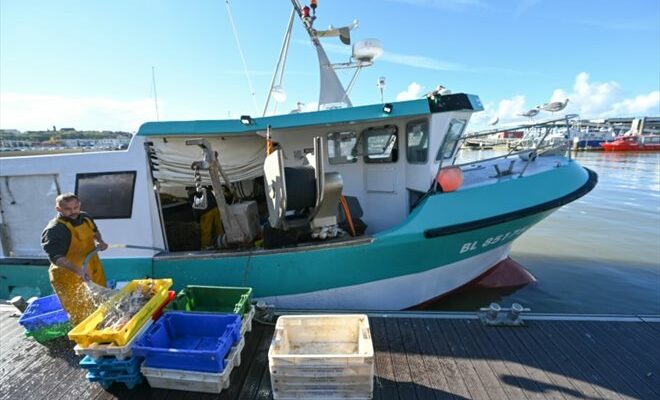(AFP/DENIS CHARLET)
Extend marine protected areas and ban bottom trawling, better counter overexploitation, less energy-consuming boats… the European Commission presented its plan to “green” the fishing sector, immediately decried by professionals and deemed too timid by environmental NGOs.
Ten years after the major reform of the Common Fisheries Policy, “structural transformations” are essential to reduce the environmental impact, while guaranteeing the profitability of the sector and its carbon neutrality by 2050, acknowledged the European Commissioner Virginius Sinkevicius.
A third of the stocks are victims of overfishing in the North-East Atlantic (against some 70% in the 2000s), some 85% of the stocks in the Mediterranean remain overexploited, and the obligation to land all catches, aimed at limiting accidental catches thrown back into the sea, remains little applied.
The “action plan” unveiled on Tuesday therefore calls on states to set their annual catch quotas while respecting the maximum levels recommended by scientists.
Above all, states will be required to adopt measures to “phasing out” by 2030 bottom fishing in marine protected areas (currently 12% of European waters, 30% targeted by 2030), regardless of their depth. Each country will have to establish its roadmap by March 2024.
The EU has already banned trawling below 800m since 2016, to help restore vulnerable ecosystems on the seabed. But the use of mobile bottom gear (trawls, dredges, demersal seine, pots, etc.) “remains very widespread”, particularly in 80% to 90% of the exploitable areas of the North-East Atlantic and “many +Natura2000+ sites and other protected areas”, laments Brussels.
Enough to compromise the objectives of the Twenty-Seven in terms of climate and biodiversity: by scraping the funds, this very fuel-intensive practice and high CO2 emitter is accused of destroying ecosystems which themselves constitute carbon sinks, weakens populations of fish that reproduce there, and promotes “disproportionate” incidental catches.
The Commission also urges states to extend “marine protected areas” to achieve the objective of 30% of marine space set in the European biodiversity plan, and to establish limits on bycatch for certain vulnerable species ( dolphin from the Bay of Biscay, porpoises, rays, etc.).
– “Russian roulette” –
The European Bottom Fisheries Alliance (EBFA), which represents 20,000 fishermen from 14 countries, judges that the ban on trawling in protected areas will “endanger 7,000 vessels” corresponding to “25% of the volumes landed and 38 % of the total revenue of the European fleet”.
An “unjustified” measure, because “certain areas have been defined to preserve birds and turtles” unrelated to the funds, and “the only result will be to move fishing efforts elsewhere” and risks encouraging the EU to import more fish from third countries, insists its president Ivan Lopez.
“We are not playing Russian roulette with the future of a sector!”, reacts Olivier Le Nézet, president of the French fisheries committee CNPMEM, according to whom “a third of the French fishing fleet” is threatened, “ from Dunkirk to Sète, from Marseille to Bastia”.
Conversely, environmental NGOs welcome the measure, but are concerned about the timetable, observing that the EU will tolerate bottom trawling for another seven years in protected areas.
For the rest of the plan, it is “tracks and recommendations (…) the Commission placing the responsibility for acting on the Member States”, regrets the NGO Bloom.
“Brussels seems to be giving the states even more time to procrastinate”, abounds Vera Coelho, of Oceana, however welcoming the stated ambition of “decarbonization”.
-“Fossil fuel subsidies”-
Brussels wants to make fishing boats and gear less fuel-intensive and encourage their switch to clean energies (hydrogen, biofuels, electricity, etc.), by inviting states to use European funds for “targeted” aid and to modernize the fleet.
In addition to the environmental impact, the objective is to reduce dependence on fossil fuels: “Marine diesel prices have more than doubled in 2022, with an energy bill equivalent to 35% of the sector’s income, compared to 13% in 2020” , explains Sinkevicius. A “difficult transition, which will be gradual”, he insists.
“An economic incentive and financial sanctions are clearly necessary for decarbonization (…) Above all, we must eliminate all fossil fuel subsidies”, which are still massive in the sector, underlines Rebecca Hubbard, from the coordination of NGO Our Fish .
By 2020, the 56,000 active fishing vessels in the EU (124,600 fishermen) had burned 1.9 billion liters of fuel to bring 3.94 million tonnes of catch ashore.
© 2023 AFP
Did you like this article ? Share it with your friends with the buttons below.




